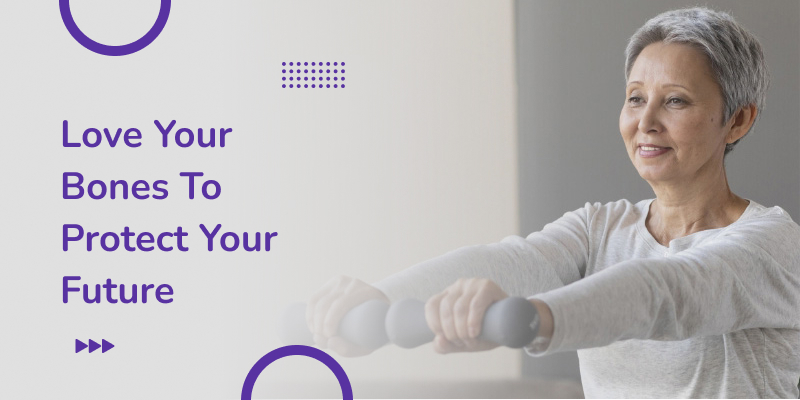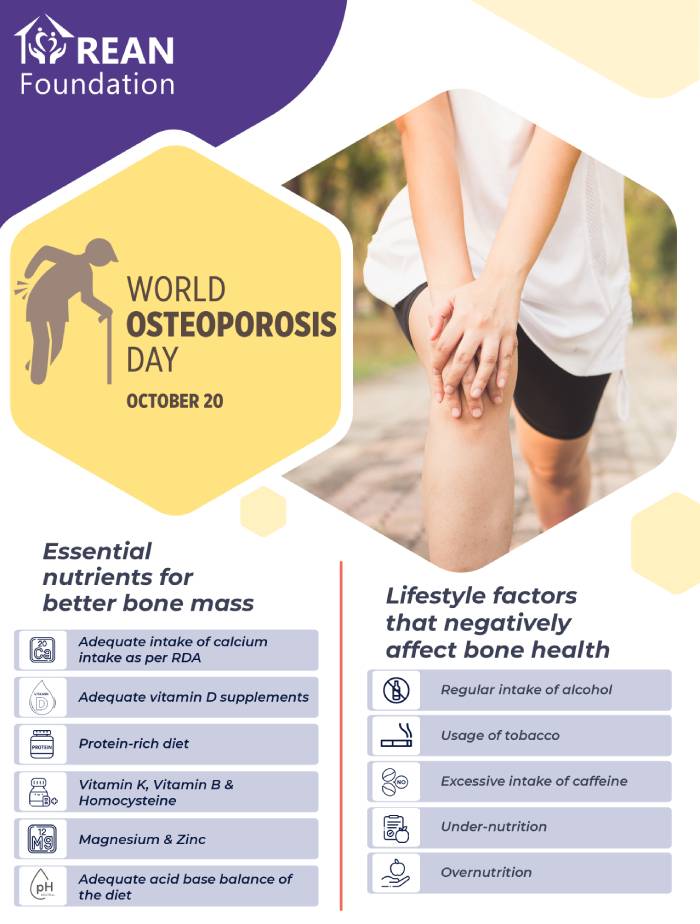
Love Your Bones To Protect Your Future
Dr. Harnam Singh Madan
October 20, 2021 12:00 am
Dr. Harnam Singh Madan
October 20, 2021 12:00 am

World Osteoporosis Day is observed on the 20th October each year to focus on the nutritional needs of our skeletal system as well as spread awareness on the importance of exercise for people of all ages to enjoy healthy, pain-free bones in our golden years. Osteoporosis literally means “porous bone”. It is the most common cause of vertebrae fractures in the spine among elderly, age-related height loss and change in posture that could lead to a hunched or rounded back. Our skeleton structure is formed before we are born and supports us throughout our lives. The sad truth is that most of us take this critical part of our bodies casually and do very little to keep it healthy and strong! Let us discuss the importance of bone health and how to manage it to prevent fragility fractures in older years.
Surveys from around the world establish the fact that low levels of calcium and vitamin D are a common cause of osteoporosis. It has been characterized as a paediatric disease with geriatric consequences. Therefore, we need to focus on developing healthy bones in early phases of life to retain the healthy bone structure and prevent early osteoporosis. Starting from an early age, our goal must be to avoid premature bone loss and maintain a healthy skeleton. There is a standard consensus on the amount of dietary calcium that we should consume, shared by leading organizations across the world; shown in the table below. U.S Institute of Medicine, vitamin D and protein dietary reference intakes for older people and the elderly32
Source: www.iofbonehealth.org
Osteoporosis, and the associated fragility fractures are most common among seniors in our society. Sufficient intake of calcium and vitamin D rich foods and supplements can help individuals who are at high risk of fractures, particularly those who have suffered fragility fractures in the past. Although osteoporosis primarily affects older people, practicing nutritious food habits and regular exercise regime can dramatically reduce your risk of bone loss or suffering future fracture.

Calcium-rich foods include:Milk, Cheese and other Dairy products. Green leafy vegetables like ladyfinger, broccoli, Soybeans. Fruits like orange
Surveys from around the world establish the fact that low levels of calcium and vitamin D are a common cause of osteoporosis. It has been characterized as a paediatric disease with geriatric consequences. Therefore, we need to focus on developing healthy bones in early phases of life to retain the healthy bone structure and prevent early osteoporosis. Starting from an early age, our goal must be to avoid premature bone loss and maintain a healthy skeleton. There is a standard consensus on the amount of dietary calcium that we should consume, shared by leading organizations across the world; shown in the table below. U.S Institute of Medicine, vitamin D and protein dietary reference intakes for older people and the elderly32
| AGE | GENDER | CALCIUM RDA (mg/day) | VITAMIN RDA (IU/day) | PROTEIN RDA (g/day) |
|---|---|---|---|---|
| 51-70 years | Female | 1,200 | 600 | 46 |
| Male | 1000 | 800 | 56 | |
| >70 years | Female | 1,200 | 600 | 46 |
| Male | 1,200 | 800 | 56 |
Key points to ensure bone health and avoid future fractures:
- Include calcium-rich foods in your diet. A diet low in calcium contributes to diminished bone density, early bone loss and an increased risk of fractures.
- Keep a physically active lifestyle. To keep the bones healthy and reduce the risk of osteoporosis.
- Usage of tobacco and alcohol weaken bones. Research suggests that tobacco use contributes to weak bones. Similarly, daily consumption of more than one alcoholic drink for women or two alcoholic drinks for men may increase the risk of osteoporosis.
- Females are at greater risk of osteoporosis than males as women have less bone tissue than do men.
- People with extremely thin bodies are at higher risk. Body mass index of 19 or less or a small body frame might increase your risk as you have less bone mass to draw from as you age.
- Hormone levels add to the risk factors. Having a higher concentration of thyroid hormone can cause bone loss. In women, bone loss increases dramatically at menopause due to dropping estrogen levels. Low testosterone levels in men can cause a loss of bone mass.
- Long-term use of certain medications. Prolonged use of corticosteroid medications are harmful for bone health. Some drugs used to treat breast cancer as well as some anti-seizure medications also increase the risk of osteoporosis.
- Ageing weakens the bones. Your bones become thinner and weaker as you age, so it is essential to do some form of exercise to maintain bone health in senior years.

Importance of Calcium:
The body needs calcium to maintain strong bones and to carry out many important functions. The bones of the human skeleton contain 99.5% of the total calcium in the body, where it supports their structure and hardness. The body also needs calcium for muscles to move and for nerves to carry messages between the brain and every body part.Calcium-rich foods include:Milk, Cheese and other Dairy products. Green leafy vegetables like ladyfinger, broccoli, Soybeans. Fruits like orange
Importance of Vitamin D:
Adequate Vitamin D levels are needed for your body to absorb Calcium from the gut. Vitamin D is found in very few foods. Unless you eat egg yolk or oily fish such as salmon, sardines regularly your only other sources are either fortified foods or Vitamin D supplements. However, your skin naturally makes Vitamin D when exposed to sunlight for long enough at the right time of the day. Exposing arms and legs for 20 minutes a day between 10am and 3pm is sufficient for fair skinned people to make the required amount of Vitamin D. People with darker skin will need to spend longer (30 minutes to an hour depending on the amount of surface area of the skin being exposed) to produce the same amount of Vitamin D. The sunlight at the time of 11-1pm ( same context) contains UV-B radiations which are useful in conversion of calciferol to cholecalciferol and vit D synthesis. Vitamin D levels fluctuate depending on the season you measure them in temperate countries like the USA, Canada and most of Europe.Also Read: The Mosquito Menace: Protect Yourself From Dengue Fever
Essential Nutrients for Better Bone Mass:
- Adequate intake of calcium intake as per RDA
- Adequate vitamin D supplements
- Protein-rich diet
- Vitamin K
- B vitamins & Homocysteine
- Magnesium
- Zinc
- Adequate acid base balance of the diet
Lifestyle factors that negatively affect bone health:
- Regular intake of alcohol
- Usage of tobacco
- Excessive intake of caffeine
- Under-nutrition
- Overnutrition
No Comments


